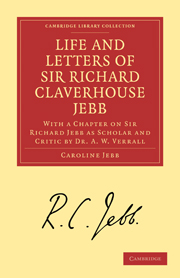 Life and Letters of Sir Richard Claverhouse Jebb, O. M., Litt. D.
Life and Letters of Sir Richard Claverhouse Jebb, O. M., Litt. D. Book contents
- Frontmatter
- PREFACE
- Contents
- CHAPTER I Family History
- CHAPTER II 1841—1858: Childhood and School Days
- CHAPTER III 1858—1862: Undergraduate Years
- CHAPTER IV 1862—1864: Fellowship and College Work.—Tour in Egypt
- CHAPTER V 1865—1870: Diary and Letters.—Public Oratorship
- CHAPTER VI 1871—1872: Letters to C. L. S.
- CHAPTER VII 1872—1874: Cambridge Life and Work
- CHAPTER VIII 1874—1878: Marriage.—Election to Glasgow Chair. Inaugural Address. Letters by Rev. Dr Denney, and Mr R. P. G. Williamson, M.A.—Visit to Italy and Greece.—Illness
- CHAPTER IX 1878—1880: British School at Athens. Hellenic Society.—Visit to Paris.—Challenge by Dr Blackie.—Visit to Venice
- CHAPTER X 1881—1883: Springfield.—Bentley.—Attack on Glasgow University.—The Troad.—School at Athens
- CHAPTER XI 1883—1889: Visit to America.—Professor Fawcett.—Death of Mr Robert Jebb.—Royal Academy.—Ode to Bologna.—Resignation of Greek Chair in Glasgow
- CHAPTER XII 1889—1894: Regius Professor of Greek at Cambridge.—Rede Lecture.—Election to Parliament. First Speech
- CHAPTER XIII 1894—1896: The Welsh Church Disestablishment Bill. Speech.—Illness
- CHAPTER XIV 1896—1898: Conference on Secondary Education.—Visit to the Riviera.—Voluntary Schools' Grant Bill. Sir John Gorst's Education Bill. Burial Grounds Committee
- CHAPTER XV 1898—1900: Death of Mr Gladstone.—Speech on the Rating of Clergymen.—Letters.—Romanes Lecture.—War. Consultation's Committee.—Knighthood
- CHAPTER XVI 1900—1901: Re-election.—Death of the Queen.—Deputation to Mr Balfour.—Irish University Commission
- CHAPTER XVII 1902—1903: British Academy.—Education Bill.—Tercentenary of Bodleian Library.—Trustee of British Museum.—Memorial Cloister at Charterhouse
- CHAPTER XVIII 1904—1905: Letters.—Order of Merit.—Defeat of Government
- CHAPTER XIX 1905: Visit to South Africa.—Last Illness
- The Scholar and Critic
- Index
CHAPTER IV - 1862—1864: Fellowship and College Work.—Tour in Egypt
Published online by Cambridge University Press: 07 September 2010
- Frontmatter
- PREFACE
- Contents
- CHAPTER I Family History
- CHAPTER II 1841—1858: Childhood and School Days
- CHAPTER III 1858—1862: Undergraduate Years
- CHAPTER IV 1862—1864: Fellowship and College Work.—Tour in Egypt
- CHAPTER V 1865—1870: Diary and Letters.—Public Oratorship
- CHAPTER VI 1871—1872: Letters to C. L. S.
- CHAPTER VII 1872—1874: Cambridge Life and Work
- CHAPTER VIII 1874—1878: Marriage.—Election to Glasgow Chair. Inaugural Address. Letters by Rev. Dr Denney, and Mr R. P. G. Williamson, M.A.—Visit to Italy and Greece.—Illness
- CHAPTER IX 1878—1880: British School at Athens. Hellenic Society.—Visit to Paris.—Challenge by Dr Blackie.—Visit to Venice
- CHAPTER X 1881—1883: Springfield.—Bentley.—Attack on Glasgow University.—The Troad.—School at Athens
- CHAPTER XI 1883—1889: Visit to America.—Professor Fawcett.—Death of Mr Robert Jebb.—Royal Academy.—Ode to Bologna.—Resignation of Greek Chair in Glasgow
- CHAPTER XII 1889—1894: Regius Professor of Greek at Cambridge.—Rede Lecture.—Election to Parliament. First Speech
- CHAPTER XIII 1894—1896: The Welsh Church Disestablishment Bill. Speech.—Illness
- CHAPTER XIV 1896—1898: Conference on Secondary Education.—Visit to the Riviera.—Voluntary Schools' Grant Bill. Sir John Gorst's Education Bill. Burial Grounds Committee
- CHAPTER XV 1898—1900: Death of Mr Gladstone.—Speech on the Rating of Clergymen.—Letters.—Romanes Lecture.—War. Consultation's Committee.—Knighthood
- CHAPTER XVI 1900—1901: Re-election.—Death of the Queen.—Deputation to Mr Balfour.—Irish University Commission
- CHAPTER XVII 1902—1903: British Academy.—Education Bill.—Tercentenary of Bodleian Library.—Trustee of British Museum.—Memorial Cloister at Charterhouse
- CHAPTER XVIII 1904—1905: Letters.—Order of Merit.—Defeat of Government
- CHAPTER XIX 1905: Visit to South Africa.—Last Illness
- The Scholar and Critic
- Index
Summary
The spring and summer were spent partly at Harrow, whither he went to take up the duties of an Assistant Master for one term, and partly abroad.
In the autumn he came up to Cambridge to lecture under very unusual circumstances. After such a degree it was natural that he should expect to be elected a Fellow. But the Master and Senior Fellows, in whose hands the election rested, rejected him while taking a man of his own year, much below him in academic distinction. No doubt they thought him young enough to wait; but to him it seemed an injustice, even an affront. A good deal of indignation was felt by some of the younger Fellows, and at least one of the Seniors thought he had good reason to feel hurt. “Romilly, one of the Seniors,” he writes to his mother on October 1st “(though not an examiner this time and personally unknown to me), wrote me a very kind note, to-day, in which he said, ‘I was much surprised as well as grieved that you were not elected this morning, as all the University expected you would be’ (pretty strong that for a Senior of Trinity) Trevelyan is justly indignant at their treatment of him. I doubt if he will stand again.”
Jebb was very angry, with the anger of hurt affection: he loved his College and she had snubbed him. All kinds of ideas filled his head. If Trinity would not have him, there were other Colleges where he would be welcomed. He was barely twenty-one and youth is rash; his friends felt something besides pure reason must be applied to the wound.
- Type
- Chapter
- Information
- Life and Letters of Sir Richard Claverhouse Jebb, O. M., Litt. D.With a Chapter on Sir Richard Jebb as Scholar and Critic by Dr. A. W. Verrall, pp. 56 - 74Publisher: Cambridge University PressPrint publication year: 2010First published in: 1907


